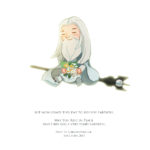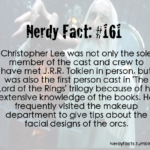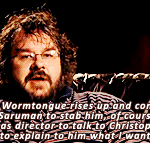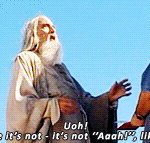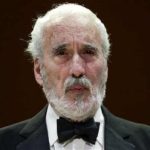Christopher Lee was the tallest actor I ever knew.
He was also, by far, the most literate. When we first met, in a Los Angeles studio where he was recording his lines as King Haggard inThe Last Unicorn, he had just recorded Haggard’s speech about his first sight of unicorns, and I mentioned that it was probably my favorite speech in the book. He immediately wanted to know, “Well, did I do it properly? We can always redo it right here.” Of course, he’d handled the lines perfectly – but writers, and writers’ opinions about their work, mattered intensely to Christopher.
That same afternoon, we discovered that between the two of us we we could call to mind just about all the lines of G.K. Chesterton’s poem, “The Rolling English Road.” We also discovered a mutual need to hit the men’s room, and my son Dan – in his mid-teens at the time – still has a very clear memory of Christopher simultaneously peeing while declaiming, in That Voice, which no one could ever keep from imitating after fifteen minutes with him:
“Before the Roman came to Rye, or out to Severn strode,
The rolling English drunkard made the rolling English road.
A reeling road, a rolling road, that rambled round the shire,
And after him the parson ran, the sexton and the squire…”I leave it to the reader to imagine That Voice in the tiled acoustics of a Hollywood bathroom.
We met a second time in Munich, where The Last Unicorn was being dubbed into German. Most of my memories of that time, and of Chris Lee, have to do with books and authors. He had known both J.R.R. Tolkien and a writer who mattered more to me, T. H. White. We had a long ongoing argument in Munich about a chapter of The Sword In The Stone that appears in the English edition of the book, but not in the American one. He turned out to be right. He usually was.
He never failed to mention The Last Unicorn as one of his very favorite books, and as one of the movies he was most proud of having made. Indeed, he left my whopperjawed – as Mark Twain would have put it – when we were being interviewed together on Austrian television, and he announced, “Oh, yes, I simply couldn’t resist a chance to play King Haggard one more time, even in another language. After all –” and he looked straight into the camera – “it’s the closest they’ll ever let me get to playing King Lear.” The camera swung toward me to catch my stunned reaction, and Chris looked across the studio at me, and winked.
But my most vivid memory, chilling as it remains to this day, has to do with the day that I and Michael Chase Walker – associate producer of The Last Unicorn, and the one who really got the film made in the first place – somehow found our way out to Dachau. I can’t now recall how we managed it, considering that neither one of us spoke German, and that you had to take both a subway and a bus to get there from the hotel where the crew were staying. But we got there somehow, and spent a good half of the day roaming with other tourists around a legendary concentration camp, peering blindly into the huge crematoriums, but staring with equal horror and fascination at the endless rows of filing cabinets containing every record of every human being who was ever imprisoned, starved, gassed, or simply worked to death in this place. Michael and I grew quieter and quieter that afternoon; until, by the time we started back to Munich we weren’t speaking at all. I think we both felt that we might say anything in words again.
The first person we met in the hotel lobby was Christopher. He took one look at us and announced, “You’ve been to Dachau.” We nodded without answering. Chris strode toward us, looked all the way down from his six-foot, five-inch altitude, lowered his voice and inquired, “Still smells, doesn’t it?”
With the end of World War II, Christopher, as a member of the Special Forces – and whose five or six languages included fluent German – had been assigned to hunt down and interrogate Nazi war crminals, and had been present at the liberation of Dachau. And, yes, the smell of death had undoubtedly faded somewhat since 1945, but it was still as real as Michael and me, wandering dazedly between the ovens and the filing system. We just didn’t know what it was, but Christopher did. And I’d know it again.
I never saw him again after Munich, though we spoke on the telephone a few times. On the last occasion, when I had called to wish him a happy 90th birthday, I remember him assuring me that “if, by the time you come to make your live-action version of your movie, I have passed on, do not let it concern you. I have risen from the dead several times. I know how it’s done.”
He worked almost to the last, as the real artists of every kind do: they work to be working, because that’s what they do, and they die when they stop. I always regarded him as the last of the great 19th-century actors. That bravura, larger-than-life style went with him: no modern RADA-trained performer would ever attempt it today, nor should they. It would inevitably come out parody, however earnestly meant.
Yet there was always more to Christopher Lee as an actor than Dracula or the Mummy or Saruman – or Sherlock Holmes. for that matter, though he was very proud of having played, not only both Holmes and Watson, but Sherlock’s brother Mycroft as well. Lord Summerisle of the original The Wicker Man – probably his favorite of his own movies – is most likely closer to Chris’s dark benignity than any other role he ever inhabited. I believe this because Lord Summerisle sings a surprising amount in that movie, and Chris passionately loved singing. If there is any such thing as an afterlife or reincarnation, I truly hope – no, believe – that Christopher Lee will return as a Wagnerian opera singer. If he hadn’t been considered too old, in his 30s, to be accepted for formal vocal training, he might have been – in his own eyes, at least – a happier, more fulfilled man. But we would have been deeply poorer for it, and never have known.

Just another WordPress site
